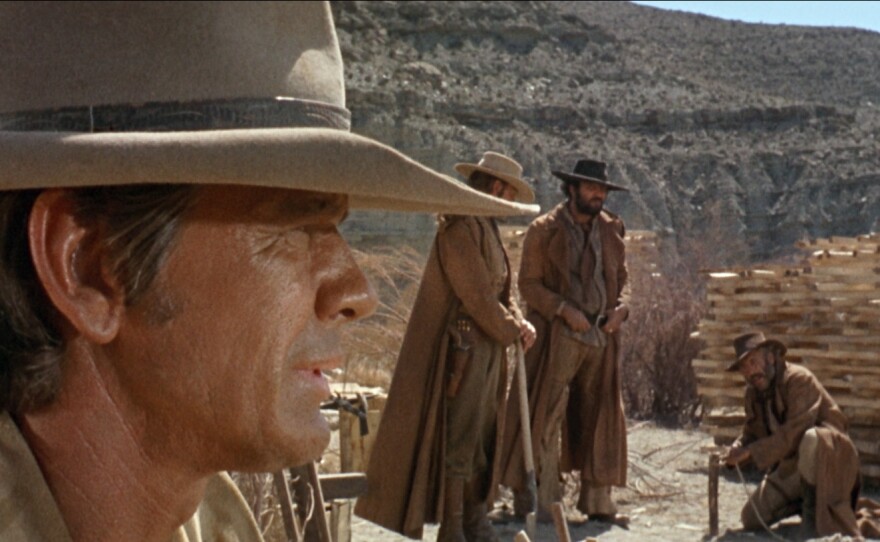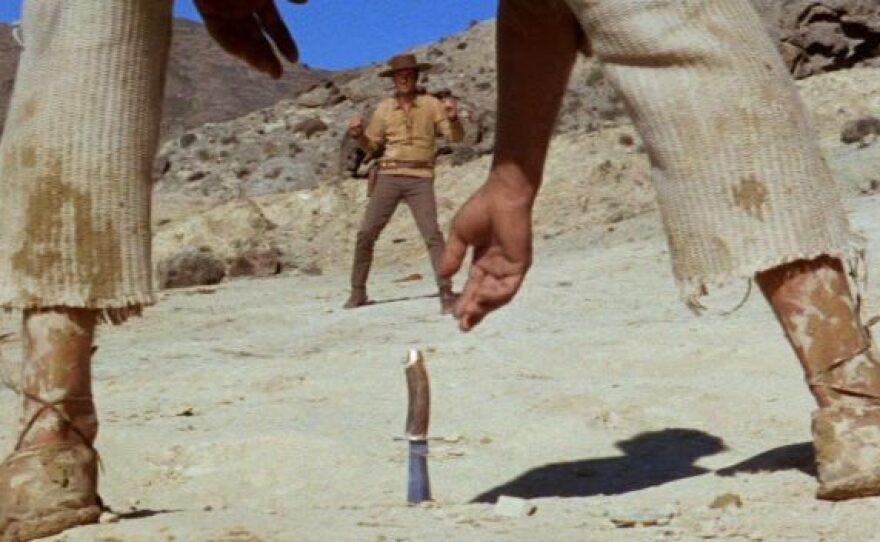They Call Me Sergio Film Series
May 24: Sergio Sollima's "The Big Gundown" (1966)
Sept. 6: Sergio Corbucci's "The Great Silence" (1968)
Oct. 11 (part of SDIFF feStivale): Sergio Leone's "Once Upon a Time in the West" (1968)
This Thursday I get to co-present a spaghetti western film series entitled “They Call Me Sergio” with Film Geeks SD and the San Diego Italian Film Festival. The first film is “The Big Gundown.”
The title of the film series reflects the fact that the three best directors of spaghetti westerns all share the first name Sergio – Sergio Leone, Sergio Corbucci and Sergio Sollima. It also pays homage to the titles of the films many of which referenced character names ranging from “They Call Me Trinty” to “My Name is Nobody.”
The three films in the series are Sergio Sollima’s “The Big Gundown” (screening May 24, 7:30pm, Digital Gym Cinema); Sergio Corbucci’s “The Great Silence” (screening Sept. 6, 7:30pm, Digital Gym Cinema); and Sergio Leone’s “Once Upon a Time in the West” (screening Oct. 11, 7:30pm as part of San Diego Italian Film Festival’s festival at the Museum of Photographic Arts).
Defining spaghetti western
The spaghetti western, a term used to refer to western genre films churned out cheaply by the Italian film industry and often dubbed into English, was born in the 1960s as the Italian film industry was looking for something new to strike a chord with filmgoers. Filmmakers such as Federico Fellini, Luchino Visconti and Pier Paolo Pasolini were wowing international audiences with Italian art house delights while Rome’s Cinecittà studios churned out more popular fare for the masses.
Just as the film industry was beginning to burn out on sword and sandal films, Sergio Leone had an idea. He had seen Akira Kurosawa’s “Yojimbo” about a ronin who arrives in a village where competing crime lords try to hire the samurai as a bodyguard. Leone noted that it was inspired by Dashiell Hammett’s “Red Harvest” and thought why not import it back. Leone, who had an affection for westerns but was disillusioned with where Hollywood had taken the genre, decided to reimagine “Yojimbo” as a western with a young American lead. That role went to Clint Eastwood who was enjoying success on TV’s “Rawhide.” But his contract did not allow him to make features in the U.S. so he went to Italy and became an overnight sensation as the Man with No Name in Leone’s “A Fistful of Dollars.”

Leone was not the first Italian or even the first European to have the idea of appropriating the American western genre (a German company was having some success doing just that). But Leone was the most inspired and proved to be the most wildly successful.
His "Fistful of Dollars" came out in 1964 and was a huge hit serving up a new kind of western hero or rather anti-hero. He was a more ambiguous and morally flexible character that could reflect the political and social unrest in Italy and elsewhere in the world. Leone would follow up his film with a sequel and other filmmakers soon tried to cash in on the popularity of the genre. Some films were just cheap imitations but others approached and even equaled the caliber of Leone’s films.
'The Big Gundown'
“The Big Gundown” from 1966 is one of those films. The opening titles very consciously played off Leone’s films by employing the same legendary graphic designer Iginio Lardani and innovative composer Ennio Morricone. Lardani’s poster art, trailers, and opening title designs came to define the spaghetti western. He experimented with animation, typography and optical effects to create an iconic visual look for the spaghetti western.
If Lardani’s graphic design gave the films a visual branding, composer Morricone defined the sound of the spaghetti western with scores that were simultaneously epic, melancholic and just a touch self-deprecating. It was the perfect tone to reflect how the tired American western was being reinvented and reinvigorated in Italy in the 1960s and 70s.
Sollima’s “The Big Gundown” is not as well known as the works of his compatriot Leone but it stars Leone favorite Lee Van Cleef (Angel Eyes of “The Good, the Bad and the Ugly”) as a lawman tracking Cuchillo (Tomas Milian), a Mexican peasant accused of rape and murder. Because many spaghetti westerns tried to cash in on the success of other films, the titles often sound like each other and the films feature the same stars. So Van Cleef also starred in a film called “The Grand Duel,” which was also confusingly called “The Big Showdown.”

Sollima’s film is more intimate than Leone’s sprawling epics “The Good, the Bad, and the Ugly” and “Once Upon a Time in the West” but it’s no less spectacular as an example of spaghetti westerns. Director Sollima, however, hated his films being called spaghetti westerns and thought the term “horrendous” and limiting. The term did begin as something derisive and dismissive. Yet it has come to capture the wild cultural mash-up of non-Americans shooting mostly in Spain and riffing off the tropes of a distinctly Hollywood genre in order to deliver pop entertainment for Italian audiences that would then find success in the U.S. The influence of spaghetti westerns can be seen in the films of Sam Peckinpah (especially "The Wild Bunch"), Quentin Tarantino (notably "Kill Bill, Vol. 2") and on Hong Kong action films especially ones by John Woo.
The genre definitely imitates American westerns but filters it through Italian style and a more modern lens. Spaghetti westerns brought in elements of Catholicism (priests, angels, churches, protagonists being crucified); politics reflecting turbulent times and unsettling ambiguity; over-the-top violence unbridled by the lingering restraints Hollywood had to deal with from its self-imposed censorship rules of the Production Code; and younger, attractive stars who suggested that heroes didn’t necessarily have to be “good guys”, just hip and cool. Eastwood has stated in interviews that he knew what he was doing with Leone was going to be different precisely because Leone had no knowledge of Production Code rules (which had been put into effect in the 1930s and officially ended in 1968) regarding the depiction of graphic violence. So Leone and other Italian directors felt free to depict violence as graphically as they wanted.
I’m thrilled to be co-presenting “The Big Gundown” (in Italian with English subtitles, which is not how the film initially screened in the U.S.) and getting my first chance to see it on the big screen where all spaghetti westerns belong because anything smaller can’t possibly fit the bold visuals and operatic flair of these brilliant Italian filmmakers. The film will be introduced by the San Diego Italian Film Festival's Antonio Iannotta.
Tickets for "The Big Gundown" are available online.






